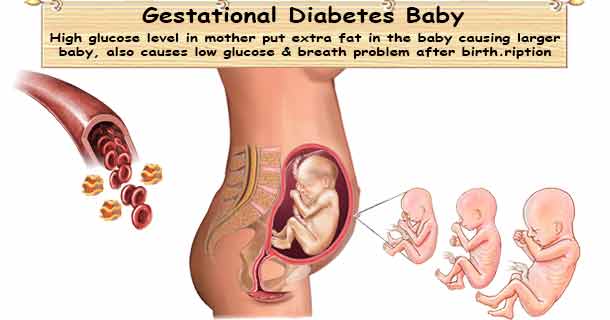Gestational diabetes baby's health care
Fetal care during pregnancy
If diagnosed with gestational diabetes before 20 weeks of pregnancy, a fetal anatomical survey should perform at 18 to 20 weeks.
All gestational diabetes should undergo a fetal growth scan at 28 to 30 weeks and 34 to 36 weeks of gestation. Also, include fetal biometry and amniotic fluid estimation.
Fetal heart should be monitored by auscultation on every antennal visit. Also, you should assess daily fetal activity; lie down on your side after a meal and absorb how long your fetus takes to kick you ten times. If your fetus does not kick at least ten times within 2 hours, then you should immediately consult your doctor.
Immediate neonatal care for the baby
Provide essential care and early breastfeeding for all newborns to prevent hypoglycemia.
After 1 hour of delivery, all newborns should monitor for hypoglycemia (capillary blood glucose less than 44 mg/dl). And monitor continuously for every 4 hours until four stable glucose numbers.
A newborn should evaluate for other complications such as respiratory distress, convulsions, and hyperbilirubinemia.
Gestational diabetes complications
Adverse outcomes of improperly treated gestational diabetes are macrosomia, stillbirth, and congenital abnormality.
The ‘Fetal Origin of Disease’ hypothesis proposes that susceptibility to adult diseases may influence by gestational programming. Journal of the Association of Physicians of India. 2008 Feb; 56():109-13, Whereby stimuli or stresses encountered by the fetus at critical or sensitive periods of development can permanently induce structural, physiological, and metabolic changes, which predispose the individual to disease in adult life [International Journal of Gynecology & Obstetrics 2009 Mar; 104 Supplement 1(): S35-8.].
Is every diabetic will have to get a Caesarian-Section?
Usually not, for most doctors suggests a vaginal delivery. However, if any complication arises during pregnancy, or if you have extensive eye disease with fragile vessels, your doctor may recommend a C-section. Approximately 50 to 60% of diabetes women have caesarian-section.
Will my baby be born with diabetes?
No. Your infant will not have diabetes at birth and will not expect to develop it. However, your baby is having your genes and thus, the slightly increased risk of developing diabetes. The risk for the infant is higher; if the father has diabetes compared with mother.
How can gestational diabetes affect your baby?
Hyperglycemia during pregnancy can affect the baby in numerous ways. It may include macrosomia, low sugar, difficulty breathing, etc.
Macrosomia - Untreated or poorly controlled gestational diabetes can harm your baby. When you have gestational diabetes, your pancreas works over to produce more insulin, but the insulin is not able to lower your blood glucose levels. Although insulin does not enter the placenta, glucose and other nutrients enter the placenta and reach your child. Baby is getting more energy than what is needed, this excess energy stored as fat and bigger baby with excess growth (macrosomia). It can make delivery challenging and more likely to become wedged in the birth canal or may need a C-section to deliver safely.
Hypoglycemia - Since the baby is getting more blood glucose than what is required. This excess blood glucose causes the baby's pancreas to make extra insulin to get rid of the blood glucose. Right after the baby is born, the blood glucose level may drop very low (hypoglycemia) because they have so much insulin in their bodies. Hypoglycemia in babies is easily treated by giving the baby a glucose solution or feeding the baby should raise the blood glucose level.
Difficulty breathing (respiratory distress syndrome) - Some babies have trouble breathing on their right after birth. It will go away after the lungs become stronger.
Development problems - Children of a gestational diabetes mother are at a higher risk for developmental issues such as language development and motor skill development.
Type 2 diabetes - Babies born to a gestational diabetes mother are at a higher risk for obesity, and when they become adults have high chance to get type 2 diabetes.
Does a diabetes mother can breastfeed her baby?
You must breastfeed your baby if it is possible; it helps both you and your baby. It is easy for you to manage your diet if you breastfeed. Your child’s risk for type 2 diabetes may be lower if you are breastfeeding your baby, and if your child maintains a healthy weight. Bottle-feeding is also acceptable if breastfeeding does not work out for you.

